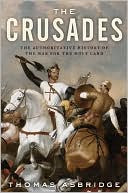

 |

|

The average rating for The Crusades based on 2 reviews is 4.5 stars.
Review # 1 was written on 2018-09-05 00:00:00 Anthony Merlo Anthony MerloYou'd be hard pressed to find a topic more politically charged than the Crusades, especially as the world sloughs out of our War on Terror hangover, and fumbles into the terrorscape of cyber threats and subornment of the United States. People feel *really* strongly about what the Crusades should mean, and how they should be interpreted. The pressure to cleave to a political narrative when writing about this has to be incredibly strong. And it is to Asbridge's credit that he resists it. Instead, he faithfully interprets the contemporary sources, more or less ignoring the massive tower of secondary scholarship that has both illuminated and influenced the field. Asbridge uses his extensive background in the period to interpret contemporary writers, but he also approaches the material with an empathy and a face-value commitment that's refreshing and rare. To put it simply: Asbridge gets the medieval mind, both in the Muslim and Christian worlds, and the result is a much more even-handed look at the motivations behind the crusading phenomena. It doesn't hurt that Asbridge has a brisk prose style that brings the narrative drama to the fore without sacrificing scholarship in the process. The crusades are, of course, a war-story, but Asbridge rightly puts the focus on the mental and emotional motivators behind the warriors, rather than straying into war-porn topics of gear, deployment and descriptions of casualties. Highly recommended. |
Review # 2 was written on 2012-06-06 00:00:00 Rod Brossman Rod BrossmanThis is a fantastic narrative history of the Crusades from the First Crusade at the end of the 11th Century right up till the end of Christian Outremer in the 1290s when Islam regained control of the Levant after nearly 200 years of 'occupation' by the Latin Christians. A really gripping, page-turning read, as Tom Asbridge writes fluidly with a really straightforward prose that is just packed full of interesting facts, analyses and hypothesis. This book, for 680 pages, covers all the main historical figures that this epoch threw up in the history books, such as Richard the Lionheart, probably the most successful warrior-king for the whole 200 years in the Levant and his contemporary Saladin, again probably the most successful Islamic ruler in the same period, the Baldwins of Jerusalem, Queen Melisende and so on. Pivotal figures in the history of the Crusades. I knew so little really about this era and what with the BBC TV series presented by Thomas Asbridge recently along with his condensed one book history of all main five Crusades, really opened my eyes and increased my knowledge of the Middle Ages. The author just does not exclusively focus upon the Western Christian aspect however, instead he also examines the Islamic leaders focusing mainly on the Ayyubid dynasty of Saladin and his heirs, explaining the fractured divisive religion that Islam was at the start of the 12th Century which probably allowed the extreme success and luck that the First Crusade had in conquering Jerusalem in 1099 that allowed them to gain a foothold in the Levant that then became known as the 'Outremer'. What surprised me the most however, is that the success of the First Crusade was never really repeated in the next 200 years - all the other four main crusades never really had the same level of success - maybe the Third Crusade under Richard Lionheart stopped Saladin from reconquering the Levant, but again indecisiveness allowed that crusade also to flounder. In fact, they all really fail afterwards some quite drastically. Also, at the end of this book, Thomas Asbridge then brings us to the present day and the current conflict in the middle-east and tries to suggest that there really is no and should not be any relationship between what happened 800 years ago and the current conflict between radical Islam and the West today. He then goes on to claim that any similarities in the rhetoric of using Crusade metaphors is plain wrong, that history has been distorted and that the Crusades were a specific product at a particular stage in history, and that not only did the Christians claim land, but it increased trade and encouraged the swapping of ideas between Islam and the West that would later help the Renaissance develop. I found it really interesting final chapter. A good read, and it has left my appetite hungry for more studying, not only of this epoch, but also for understanding more about the Middle-Ages too. 5 stars. |
CAN'T FIND WHAT YOU'RE LOOKING FOR? CLICK HERE!!!